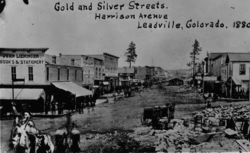Mining Law of 1872, United States

The United States Congress passed the Mining Law of 1872, also known as the General Mining Act, to encourage settlement in the West, at a time when mining consisted mostly of individual prospectors. The Law pertains to the mining of hardrock minerals such as silver, gold, copper, platinum, uranium, natural gas, and oil on federal land. Under this Law, individuals or companies have the right to stake claim on public domain land without the need to pay royalties to the federal government, paying only an annual claim fee. The miner may decide to patent the claim to gain title of the claimed lands and extracted minerals by paying a patent application fee plus US$2.50 to $5 per acre after patent approval.
Over the years, Congress removed many lands and minerals from regulation under the Mining Law. Initially, the Law referred to all minerals except coal; however, the Mineral Leasing Act of 1920 set new regulations on oil, natural gas, oil shale, phosphate, and sodium resources. The Hardrock Mining Act removed Indian and military reservations, wilderness areas, and water and power projects, and the designation of National Park System lands and National Historic Sites protected certain federal lands from all mining activities. Later acts removed other lands and minerals from under the Mining Law’s control, yet the Act still affects activities pertaining to some lands and minerals today.
Further Reading
- Issue Brief for Congress: Mining on Federal Lands (National Council for Science and the Environment)
- Mining Law of 1872 as Amended (The Prospector E-Magazine)